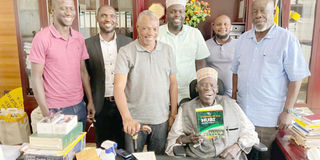Prime
How citizenship eluded the Nubi for 100 years

The Second Deputy Prime Minister and Deputy Leader of Government, General Moses Ali with the organisation committee that oversaw the launch of the book, “Odyssey of the Nubi”. The book was launched last year in September at Boroli Pakele in Adjumani District. PHOTO/courtesy
What you need to know:
The book begins with the all-too-common association of the Nubi in East Africa with the British and their colonial enterprise that saw Captain Frederick Lugard pick up the men left by Edward Schnitzer, known to history as Emin Pasha, due to his role in the Turko-Egyptian administration
Citizenship confers the status of freedom, granting the citizens certain rights, duties, and responsibilities that aliens and non-citizens living in the country are denied or only get partially. This definition, according to the Encyclopaedia Britannica, is an issue Gen (rtd) Moses Ali’s book, The Odyssey of the Nubi: From Soldiers of the British Empire to Full Citizens in Uganda, brings to the fore, once again. The book, by Gen Ali who is also the Second Deputy Prime Minister and Deputy Leader of Government, challenges the masses to re-examine the issue of citizenship, which is often taken for granted until the need for it emerges—sometimes in the wake of agitation or even confrontation.
The book begins with the all-too-common association of the Nubi in East Africa with the British and their colonial enterprise that saw Captain Frederick Lugard pick up the men left by Edward Schnitzer, known to history as Emin Pasha, due to his role in the Turko-Egyptian administration. The author clarifies that the Nubi in Uganda have little to no link with the Nubians in Sudan, except for their adoption of Islam and the colloquial Arabic, which gave birth to Ki-Nubi language.
The book therefore affirms that “the Ugandan Nubi, were … a social creation of the many Southern Sudanic tribes with a shared history, religion (in this case Islam) and social experience.” The same is implied of the Nubi in Kenya, Tanzania and Malawi, also referred to in the book.
It further highlights how the initial military career the Nubi had adopted, right from the enlistment of their forefathers in the Turko-Egyptian army, and later as mercenaries of the Imperial British East Africa Company, motivated them to join the King’s African Riflemen (KAR) and later Uganda Army (UA).
The big question…
How did citizenship in Uganda elude the Nubi for close to a century, before they could be recognised as full citizens in Uganda in 1995? That is the question this book attempts to answer in the nine chapters in which the author traces the process alongside the political history of Uganda.
The research and candid knowledge that the book illustrates in each chapter, thanks to the proper reference list, qualifies its body of work for academic use and reference without much question. This is because scholarship is fused with the author’s knowledge of the Nubian family connections that have since constituted an ancestral lineage to retell a story of historical significance for the Nubi, and Uganda as a country.
Early in the book is the identification of the prominent Nubi families in Uganda and their origins. This expose reveals that the Nubi originate from multiple ethnic groups, and not all from Sudan, as people have assumed. Their efforts of forging a unique identity from this multiplicity of ethnicities should be a lesson that states like Uganda, forged out of the British colonial craft, should learn from, for forging a nation.
Islam connection
The Muslim community in Uganda also owes it to the Nubi for the early and continued contribution they have made to establish part of the roots and the development of the faith in Uganda. The fact that Islam held disparate peoples together and allowed them to build community to the extent of forging an ethnic group becomes lessons for the bigger Muslim community to draw from.
It reflects that religion can surmount the ties of kinship and blood brotherhood to create an even stronger bond that becomes the basis of socio-political organisation. This is a tough call to build bridges and ties across boundaries of ethnicity, religion, language, culture, gender, class, et al.
The challenge is that these identity factors form the bedrock many seek to take refuge in, while thriving on ‘othering.’ Consequently, building a nation out of the tapestry of multitude identities has sometimes been an uphill task.
In fact, the book is also a testimony of the identity phenomenon as an enduring and unalterable mark. In what ways can these identities become a contribution to the overall nation other than a distraction from the forging of a nation?
Citizenship
The issue of citizenship for the Nubi in Uganda is partly attributed to the legacy of British colonialism. As the author puts it: “With unfathomable intentions, the British marshalled the Nubi into their slave soldiers. They paid no attention to any meaningful gains for the Nubi, but rather dwelled on achieving British … interests.”
In many ways, the Nubi question resembles other cases of unfinished “business” the British left in many parts of the globe. From the questions of slave trade to the establishment of colonial administration using African proxies to lord it over fellow Africans, and finally leaving many of their former allies without resolving some of the crucial needs of these former collaborators.
Who is Gen Ali?
At a glance.
Moses Ali, who turns 85 in April, currently serves as the Second Deputy Prime Minister. He is also the Deputy Leader of Government Business in the House. A retired military general, he has represented East Moyo County from Adjumani District in the House since 2011. As well as receiving a military education from Israel and the United Kingdom, Gen Ali is a trained lawyer.





